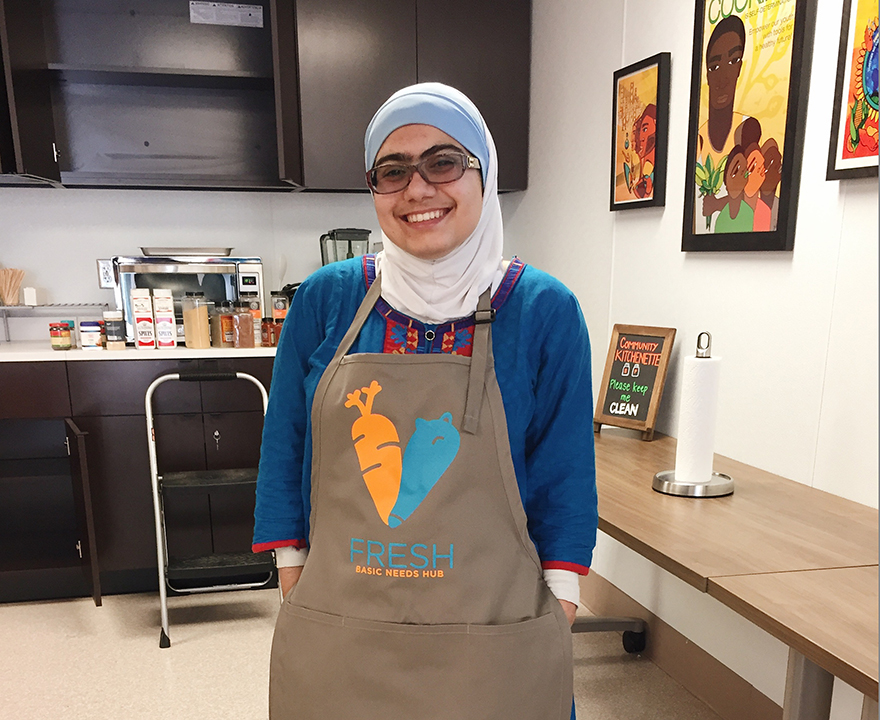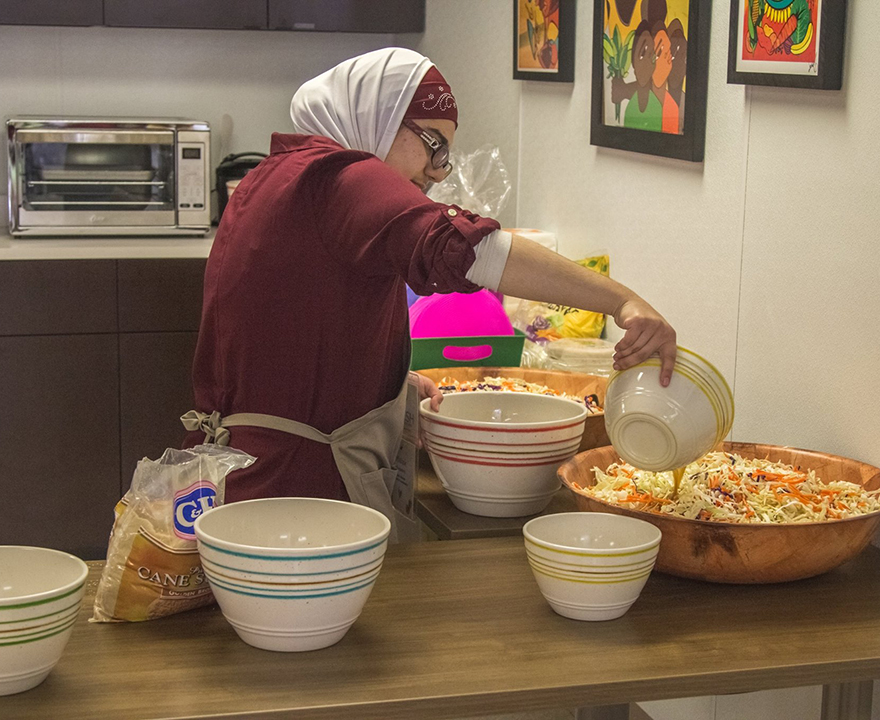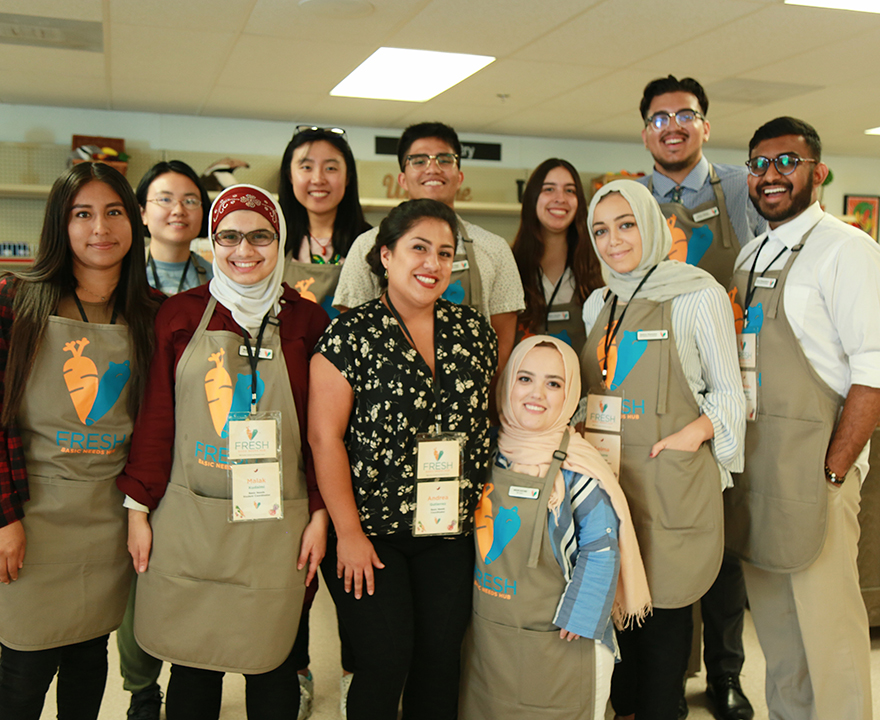A hunger for justice

A hunger for justice
- July 18, 2018
- How Malak Kudaimi, ’18 international studies and public health, is battling against food insecurity
 Malak Kudaimi’s first few months at UCI were difficult. She was commuting to campus
and her days away from home were long. A campus meal plan was too expensive, so she
resorted to eating food like ramen, which was cheap, but not healthy. Without adequate
food, she felt like she wasn’t able to perform as well as she could with her studies.
It wasn’t until she found a part-time job that she felt like she didn’t have to try
to go as long as possible without eating. Looking back at those days, she says, “I
thought it was an experience only I had.”
Malak Kudaimi’s first few months at UCI were difficult. She was commuting to campus
and her days away from home were long. A campus meal plan was too expensive, so she
resorted to eating food like ramen, which was cheap, but not healthy. Without adequate
food, she felt like she wasn’t able to perform as well as she could with her studies.
It wasn’t until she found a part-time job that she felt like she didn’t have to try
to go as long as possible without eating. Looking back at those days, she says, “I
thought it was an experience only I had.”
Kudaimi, who graduated in June, has since served as an intern for ASUCI's Food Security Commission and has been a lead researcher for an Undergraduate Research Opportunities Program (UROP) project about campus food insecurity. She later presented the group’s findings at the annual UROP Symposium. She worked as one of the Basic Needs Student Coordinators for the newly established FRESH Basic Needs Hub, the resource center on campus dedicated to helping students meet their basic needs. She was later promoted to Programming Student Manager where she helped put together workshops on cooking, nutrition, and personal finance. Next month, she’ll begin a yearlong fellowship with the Emerson National Hunger Fellows Program, where she’ll split her time between working at an anti-hunger community-based organization in Seattle and a national organization working on hunger poverty policy in Washington, D.C.
Making a difference
Kudaimi has since realized she was not alone in the hunger she experienced freshman year. “Food insecurity is a public health issue. Students won’t be successful and thrive if they don’t have access to healthy food,” she says. It wasn’t until she read the evaluation forms the students filled out after attending one of her FRESH seminars that Kudaimi realized how widespread the issue was and the significant impact she was making in tackling it. “The work we did had tangible effects in students’ lives. They gained life skills they didn’t have before,” she says excitedly.
 Broadened perspective
Broadened perspective
It seems that Kudaimi’s collegiate journey has been one of expanding perspective. As her experience with hunger expanded from the personal to the classroom and the community, so has her determination and commitment to combat health inequality. Soon, she will take her passion to fight food insecurity to the national level, when she begins her fellowship.
In the classroom, Kudaimi learned about why the social inequality she witnessed at the food pantry existed in the first place. In regards to her international studies classes, Kudaimi says, “They shaped how I view social inequities. I learned how the legacies of colonialism are still prevalent today. Those classes really complimented everything I was doing on campus and what I was learning in my public health classes. I didn’t just want to scratch the surface, but get to the root cause of the issue.”
A leader
“She’s one of those students you hope to have as a peer some day,” says Miryha Runnerstrom, associate professor of teaching and director of undergraduate education in public health. Kudaimi was a student in several of Runnerstrom’s classes, including the yearlong public health honors research and thesis course. Runnerstrom recalls how Kudaimi asked the brave questions no one else was willing to, and how she could rely on Kudaimi to notify her fellow students about clarifications to the coursework. “Malak is a leader. She’s bright and compassionate and all the things we hope for in a young scholar,” Runnerstrom says.
Start before you’re ready
Kudaimi’s advice to fellow Anteaters who may be interested in a cause, but may not know where to begin, is, “Start before you’re ready. If you see something that interests you, just go for it, even if you don’t know where you’ll end up.” She admits to not knowing how to conduct research before she applied to work on the UROP project and to not knowing much about the issue when she applied to be an intern for ASUCI’s Food Security Commission. “Start before you’re ready,” she says again. “If you feel the pull, join a club, volunteer. You’ll meet people and be introduced to more opportunities. You’ll grow as an individual.”
A global citizen
Kudaimi wants to tackle food and health inequalities on an even larger scale. She eventually hopes to work for international organizations such as the World Health Organization, UNICEF, or the UN. After her fellowship ends next year, she plans on pursuing a master of public health degree with the hopes that it will help make her a more powerful agent to combat health inequality around the world. “I want to work on creating interventions to help communities thrive,” she says.
Kudaimi immigrated to the U.S. from Syria when she was in the third grade. “I’ve never just known the U.S.,” she says. “Ideally, I’d like to spend half my time working here and half my time working abroad, perhaps in the Middle East. Eventually, I’d like to use my knowledge of Arabic and give back to communities I come from,” she says.
Kudaimi has come a long way since those first difficult months of her freshman year. She’s channeled what she saw as an injustice, not only affecting her, but her classmates as well, and found a way to turn knowledge into action.
-Jill Kato, UC Irvine
Share on:


